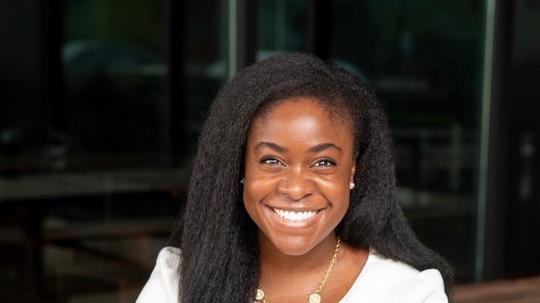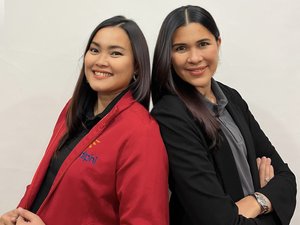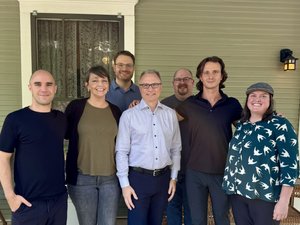It's only been two weeks since Lawrence Humphrey created an Instagram account under a straight-to-the-point banner: Tech can do better. And, already, he and his collaborators are finding a lot of people agree with the sentiment.
Humphrey is an IBM strategist and consultant in Austin who has been writing about the lack of diversity in the tech industry for years. He, like many underrepresented tech workers, has been pulled into company conversations about diversity for years only to see efforts fall short of what's needed to truly change the industry.
“Systemic problems require systemic solutions," he said. "Everything just seemed too small and it just didn’t seem to reach the magnitude of what would solve the problem.”
So he, along with Moses Harris, a site architect and development lead at IBM, and others at major tech companies have been taking an approach that's very familiar to the industry they work in. Their goal is to equip fellow Black tech employees with a playbook to create change from within the Big Tech and startup companies where they work.
“We have the tools to deal with this. You break it down. You attack it in sections. You figure out what progress looks like," Harris said. "You figure out what your outcomes are. And then you figure out how to get to those outcomes in bite-sized chunks. It’s the same way that IBM or any other tech company tackles the problems they get hired for – but doing it for social justice and doing it for social change."

Already, employees from Favor, Salesforce, Splash, IBM, Facebook, Microsoft, Postmates and RealPage have shared their photos with the Tech can do better. Instagram account. But the core of Tech can do better. is found in an evolving Google Doc that has dozens of collaborators and a series of recommendations and supporting data anyone can share with decision makers as a roadmap to a more equitable workforce.
Among its actionable recommendations are publishing company goals and strategies for hiring diverse candidates; creating better avenues for professional growth; publishing a plan to diversify executive boards; exposing and closing the racial pay gap; divesting from projects that worsen social inequities; and using the company's influence to advocate for new laws to improve diversity in the workforce.
"Once an idea is out there and people can see a better future, it’s hard to un-see that."
It provides links to examples of what companies have already done, as well as highlighting data to verify the problems they're trying to address. And it's growing every day, with 30-50 active collaborators in the document at any given time.
Tech can do better.'s organizers want to get the document in front of as many people as possible. And, already, they've found support from a yet unnamed Fortune 50 company as well as tech workers in every major U.S. tech hub from Silicon Valley to New York.
“You can’t un-ring a bell," Humphrey told Inno on a Zoom call. "Once an idea is out there and people can see a better future, it’s hard to un-see that. Once you plant the seed, that’s it: people are going to hold people to a higher standard.”
Humprey and Harris, who are working on Tech can do better. separate from their day jobs at IBM, said they hope demanding change from within companies now will be part of a larger movement to create an equitable future for future generations of Black tech enthusiasts.
Harris said he got his start in tech when he was 13 when the long-standing nonprofit Black Data Processing Associates put him in coding classes and held national competitions. So he's seen how it can work.
“This isn’t a new problem, and the conversation has gotten a little bit better over time but the excuses haven’t changed," he said. "So I really want the transparency to be a point of fact – it’s not even something people have to ask for.”
Humphrey, who has written about race and diversity in tech on Medium several times, said he wasn't exposed to tech career opportunities as much growing up -- but he hopes future generations will.
“I want to be that mentor for my past self," Humphrey said. "But ultimately, and speaking very candidly, I want future generations to inherit less of the bullshit that we inherited."
Demanding more from the startup and VC ecosystems
The Tech can do better. initiative is among several going on in Austin -- and leaders in many of Austin's diversity-oriented organizations are voicing frustration at the lack of progress in the tech startup and venture capital landscapes.
Janice Omadeke, co-founder of The Mentor Method and Austin Mosaic Awards, said the Black founder experience is unique because it mixes of hundreds of years of oppression with this new era of rapid innovation where creating something new, scalable and impactful seems realistic.
Meanwhile, the latest stats show women get around 2% of total venture capital funding, and VCs only send a small portion of that to Black women -- .0006%, according to one analysis.
“That number isn’t a mistake," Omadeke said. "We’ve had venture capital around long enough that people could take action if they wanted to.”

She said the venture capital community and others with abundant resources need to put their money where their mouths are.
“Performative measures aren’t enough. And the Black community is taking note. Period," she said. "You can send an email that says you stand with us. We appreciate that. But real action goes beyond a three paragraph email, and that’s what the Black entrepreneur community is waiting for and that’s what we plan on holding our allies and business partners accountable for moving forward.”
Stephen Straus is among the allies in Austin who have taken action. Last year, Straus, a former general partner at Austin Ventures who is managing director at KUNGFU.AI, founded the Diversity Pledge. It set out to encourage tech CEOs to agree to publicly report diversity metrics and to have their investors agree to take at least 10% of their pitch meetings from underrepresented groups, including people of color, women and LGBTQ communities.
It drew significant support from the local VC community, including from Next Coast Ventures, Silverton Partners, Active Capital, True Wealth Ventures, Moonshots Capital, Capital Factory, Techstars Austin and Techstars Impact, DivInc, Southwest Angel Network, SKU and Hurt Family Investments.
Since then, Diversity Pledge has been woven into Austin nonprofit and impact investing fund Notley, and it's largely being reduced to a newsletter focused on D&I issues, said Kelli Newman Mason, the VP of diversity, equity and inclusion at Austin social good venture firm Notley.
“From our perspective, Diversity Pledge is like a first step," she said. "It gets it on your radar, but it’s not binding.”
Meanwhile, she said Notley is focused on its Notley Tide initiative that helps raise funding for anti-racism and racial justice nonprofit organizations in Central Texas. Additionally, it has worked on an open letter being signed by local tech CEOs, which asks those who sign to take actions such as requiring all recruiters to complete training on identifying and removing bias from the hiring process.
That, Newman Mason said, provides internal and external measures and creates accountability for those involved.
“People can pledge, and people can post on social media and make statements. But if they're not being held publicly accountable, life gets in the way, business gets in the way and you move on because it doesn't feel as pressing.”
Straus said he's also working on a new project called Recode the Quo, which has worked with one cohort of CEOs working to implement better diversity practices through coaching and collaboration.
He, like others interviewed in this story, bemoaned the lack of progress over the years. Straus said he was born in 1965, just after the Civil Rights Act was signed.
“There have been milestones along the way, but there has been nothing really dramatic," he said. "But with what’s happening right now, there's a great opportunity.”
He said that while tech's diversity stats are terrible, there are endless cases that show diversity and inclusion improve companies' culture, creativity and bottom line. But, he said, you have to also focus on the personal side of it.
“I firmly believe that you can’t just change your company," he told Inno last week. "You have to change yourself at the same time. It requires a personal journey at the same time there’s the corporate journey.”








